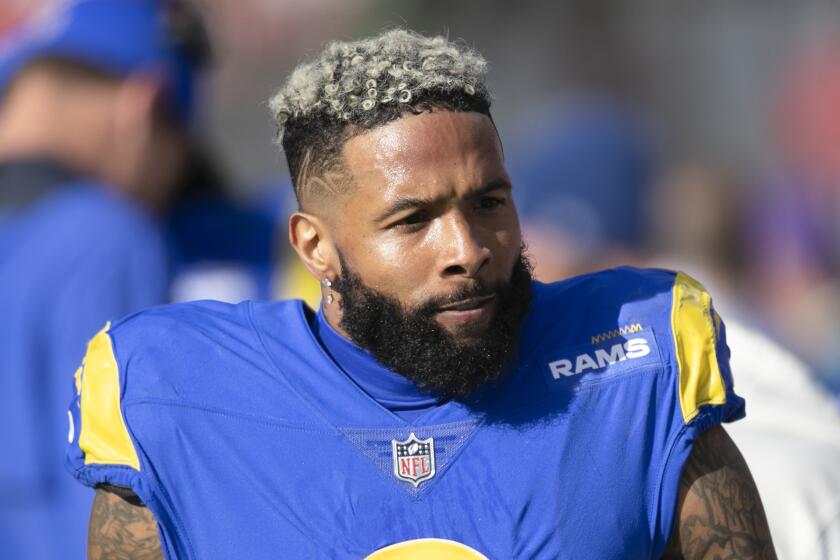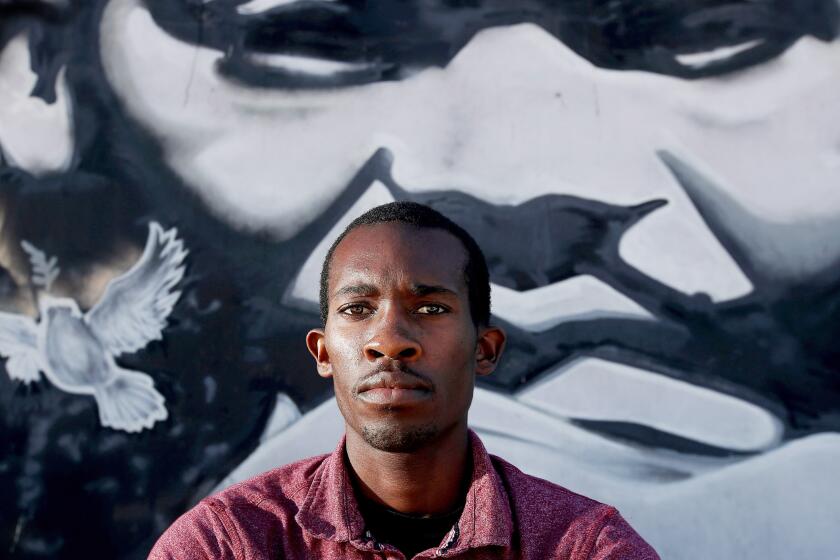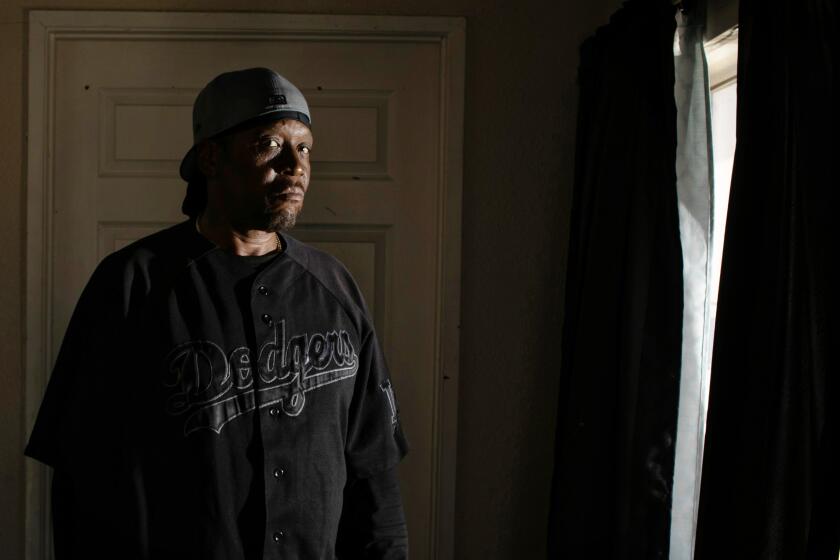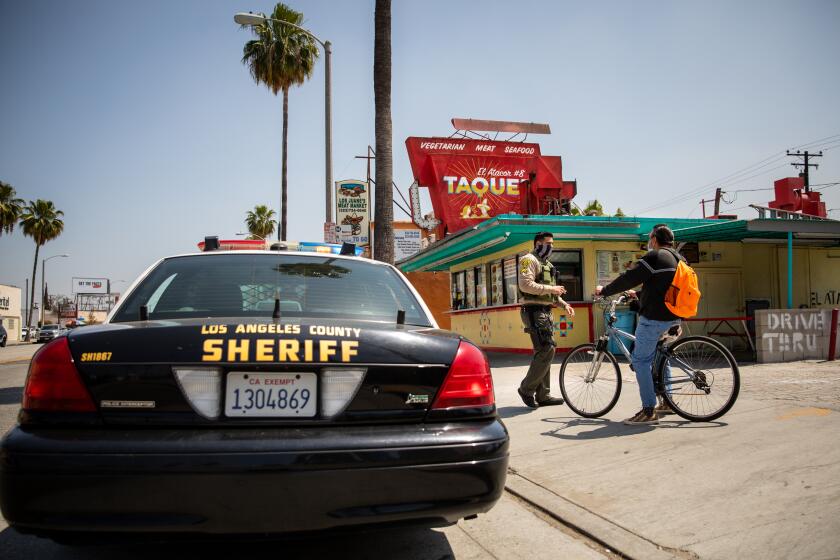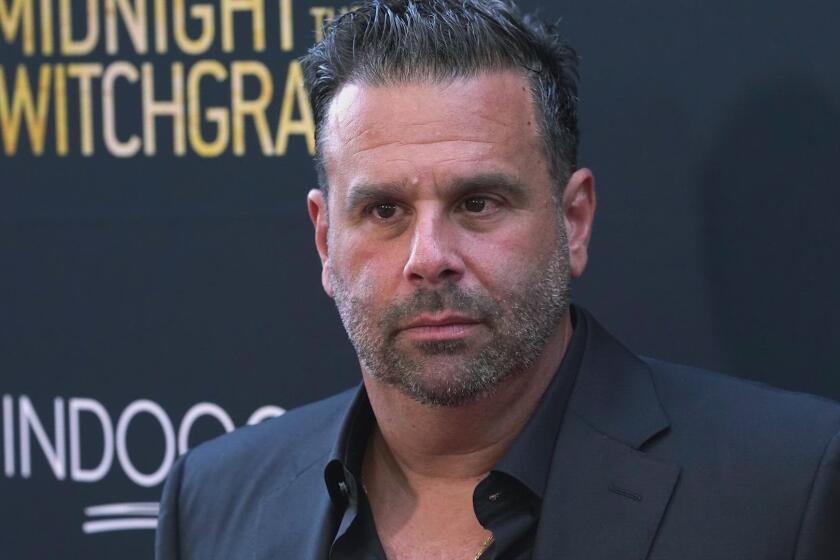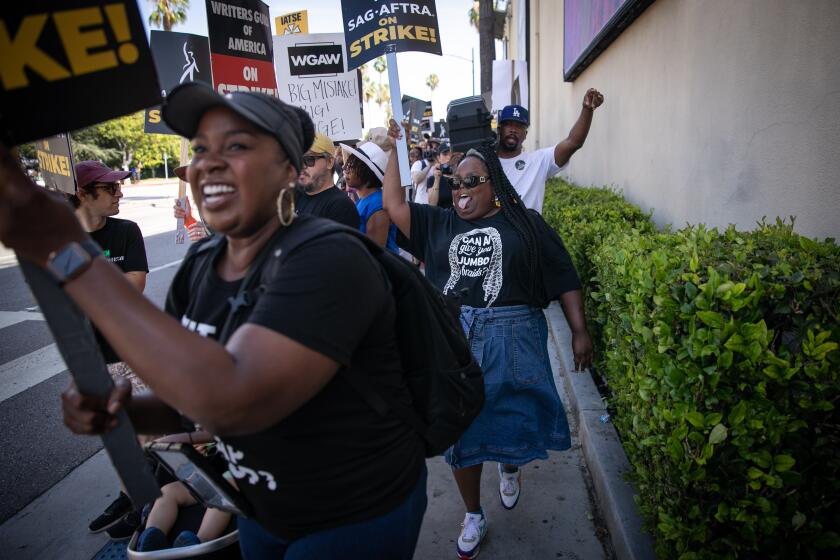American Airlines is sorry for accusing David Ryan Harris, who was traveling with his kids, of child trafficking
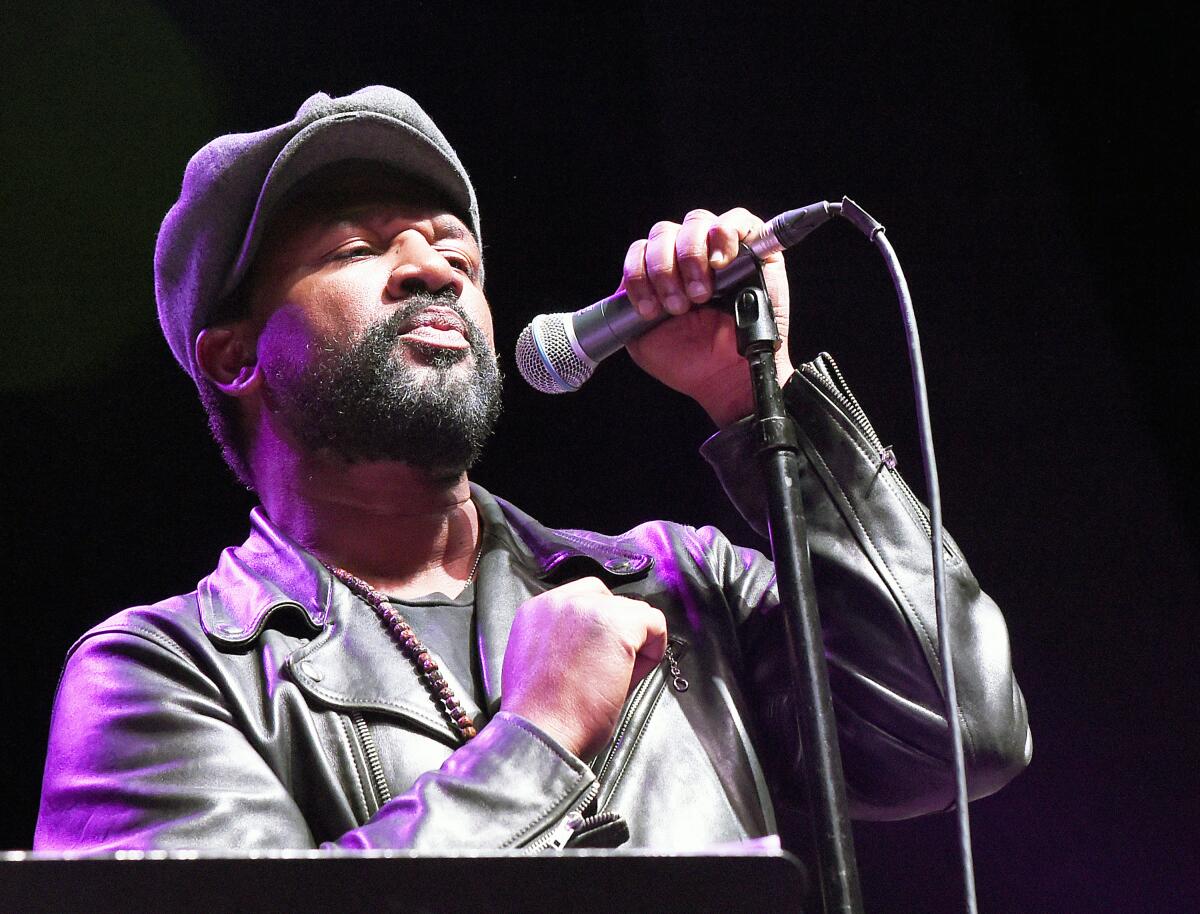
- Share via
American Airlines has apologized to musician David Ryan Harris for stopping and questioning him at LAX last month because they suspected he was trafficking children. The boys are his own kids.
The singer-songwriter, who is Black and was traveling with his two biracial children, questioned whether the incident was an instance of racial profiling, which he said had left him “shocked and humiliated.” He joins a list of American Airlines passengers, including Black celebrities, who have been removed from flights by airline employees. The incidents reignited conversations around racism toward Black travelers, which sprang up amid nationwide uprisings following the 2020 murder of George Floyd.
This week, American Airlines issued its apology to Harris — who has toured with John Mayer and performed with the Dave Matthews Band and Carlos Santana — nearly three weeks after the incident. The airline said that the flight attendant did not follow policies on identifying possible signs of human trafficking.
Authorities say NFL free agent Odell Beckham Jr. was removed from an aircraft before takeoff at Miami International Airport after failing to respond to requests to buckle his seatbelt and appearing to be unconscious
“Through coaching and counseling … our flight attendant realizes that their interaction and observations did NOT meet the criteria that human trafficking was taking place,” American Airlines wrote in a statement to Harris, which he shared on Instagram on Wednesday. “Our flight attendant in question wanted to make sure that you were aware that they sincerely offer a heartfelt apology to you and your family for their actions, and the results that their actions generated.”
Harris and his two children, 7-year-old Hendrix and Truman, 12, were flying from Atlanta to Los Angeles on Sept. 15. They were planning on watching the Rams’ home opener against the 49ers at SoFi Stadium later that weekend, the singer recalled in a series of videos posted to his Instagram on Sept. 23.
Shortly before landing, a flight attendant had asked his children for their names. His 7-year-old, who Harris said is shy and was tired from a 4 a.m. start time to catch their early flight, didn’t immediately respond, instead looking toward Harris. “One of them is pretty shy — I always have to tell him, ‘Hey buddy, tell the guy your name, shake his hand, look him in the eye,’ and quite frankly he doesn’t owe that to anyone,” he said of his son Hendrix.
After landing, Harris was met at the gate by an airline employee and four police officers who began to question his children and asked if they were OK.
Bernard Robins, who was detained outside his parents’ South L.A. home by fellow LAPD officers, said the episode typifies the style of biased policing that’s practiced in some parts of the city.
“Apparently a flight attendant had called ahead with some sort of concern that my mixed-race children weren’t my children, because they were unresponsive during an interaction with her,” Harris said in the video. “I wanted to go through the roof, but I did not want my kids to see me handle the situation with anything other than grace and class, and me not lose my mind, although I want to tell these people some choice words.”
After the questioning, the officers left, and the airline employee offered to show Harris to baggage claim.
“Maybe ... just maybe it isn’t a race thing, but when you don’t respond at all, I’m left to make sense of the altercation on my own,” Harris captioned his Instagram post after the airline had failed to respond to his complaint about the incident more than a week later.
In the last decade, the two largest race discrimination cases brought by the federal government in the Golden State alleged widespread abuse of hundreds of Black employees at Inland Empire warehouses.
In the following days, Harris went on to post a series of other videos in which he shared the developing situation, including a call from an American Airlines agent who explained that they were conducting an investigation into the incident. He asked the agent why they hadn’t looked up the flight passenger information to confirm his name, or other forms of identification, before calling authorities. He said both he and his children have frequent flier accounts with the airline. “There were many steps she could’ve taken,” he recalled telling the agent. “At the bare minimum, it was a knee-jerk reaction that could’ve been avoided.”
The incident caught the attention of fellow artists, such as Mayer and Questlove, who signaled their support for Harris on social media.
In a statement to The Times, the airline said, “At American, we do not tolerate discrimination of any kind as it does not align with our values, and we thoroughly investigated Mr. Harris’ claims. A member of our team reached out to discuss his experience and how we can continue to best care for our customers. We are sorry for any misunderstanding.
“American has a longstanding history of working to ensure our customers feel valued and respected at every touchpoint along their journey, and we rely on our collective team and partners to provide critical objective insight, perspective and support on issues where we can improve our processes and training.”
Black travelers leveling complaints of racism toward American Airlines is a longstanding issue for the company. In 2017, the NAACP issued a travel advisory, warning Black travelers that flying on American Airlines could subject them to “disrespectful, discriminatory or unsafe conditions,” citing four instances from that year in which Black passengers were forced to give up their first-class seats.
Discussions around the issue were reignited late last year and early this year, when several Black celebrities said they faced similar treatment within months of one another.
In November, NFL star Odell Beckham Jr. was removed from an American Airlines plane in Miami that was bound for Los Angeles. Authorities said the former Rams Super Bowl champion had “appeared to be coming in and out of consciousness” and that he was removed out of fear that Beckham Jr. was ill and “his condition would worsen.” The airline added that he had failed to fasten his seat belt before takeoff. Daniel Davillier, Beckham Jr.’s attorney, said the attendant merely “wanted to prove he had the authority” to kick him off the plane.
Months later, in January, rapper and Black Star member Talib Kweli was escorted off an American Airlines flight from Austin, Texas, to Los Angeles after he and a flight attendant had a disagreement about luggage space. After the argument with the flight attendant, a second attendant came and sorted out the issue with Kweli, and they were able to properly stow his luggage beneath his seat, according to videos of the incident recorded by the rapper and shared on his Instagram.
But before taking off, an attendant told Kweli he had to leave the plane because the crew didn’t feel safe. After he refused, citing that he wasn’t breaking any rules and had remained calm throughout, three police officers came to escort him off. At one point, an attendant had threatened that if he didn’t follow their instructions, he would be jailed.
“I’m a Black man in America — I paid good money for this seat, why am I being told that I’m going to jail?” he said to the officers while explaining the incident, according to the video.
The EEOC is suing Tesla for “widespread and ongoing” racial harassment in its workplace, adding to other race discrimination legal actions against the company.
During that same week, track star Sha’Carri Ricardson was removed from an American Airlines plane after an argument with a flight attendant over the use of her phone leading up to takeoff, according to now-deleted videos she recorded and shared on social media.
In a statement, an American Airlines spokesperson said Richardson was booked on a later flight and that the airline had reached out to the attendant to “learn more,” according to NBC News.
“If this is how they are treated Black folks with fame privilege imagine how they are treating Black folks without large platforms!” Kweli wrote in a separate post several weeks after his incident, referring to the other incidents involving Richardson and Beckham Jr.
The airline has also faced two lawsuits in recent years from its passengers, both alleging racial discrimination. The first was filed in June 2020 by Elgin Banks, a Black man from Arizona who was on a flight from Los Angeles to Phoenix. Banks alleged that a white flight attendant told him to gather his belongings and leave after he tried to switch his seat, according to court documents obtained by The Times. Four of six other passengers who were also kicked off the plane after protesting the airline’s move joined Banks in the suit.
Martin G’Blae, who worked for Emmett in 2020, brought a lawsuit claiming the low-budget film producer had created a toxic workplace. Terms were not disclosed.
KTLA, which was first to report the incident, obtained video of parts of the altercation.
A spokesperson for American Airlines told NBC News that the allegations “are not a full or accurate portrayal of the incident.” A federal judge eventually threw out the case in 2022, saying among other things that the group had “failed to state a claim for race discrimination,” according to court documents.
A second lawsuit was filed against the airline in 2021 by Troskie Stewart, a Black man who had boarded an American Airlines flight from Miami to Atlanta. He alleged he was removed from the plane after a run-in with an attendant who was acting aggressively toward him, “yelling and screaming” in an “act of blatant racial discrimination,” according to court documents obtained by The Times. Court records show that he voluntarily withdrew his complaint in March. The airline’s attorneys claimed the case was filed in the wrong federal district court, and Stewart and his attorneys failed to respond by a deadline set by the court.
After months on strike, Black writers and actors will soon find out whether members of the WGA and SAG-AFTRA truly care about diversity and inclusion.
Harris says his experience has also affected his children. He said they no longer want to fly American Airlines. Hendrix, his 7-year-old, asked him if he had done something wrong.
Last week, Harris started a Change.org petition asking the Transportation Security Administration to implement mandatory ID checks for children traveling with parents, as a way to “ensure fairness and eliminate unnecessary encounters like mine” and to make sure there is a process to catch actual traffickers, “who exploit loopholes in our current system.”
“This incident left me shocked and humiliated, but it also made me realize the potential harm that can arise from leaving determinations of proof of guardianship up to the discretion of flight attendants, pilots, or concerned passengers,” Harris wrote in the petition. “It is not fair nor justifiable to subject innocent parents and their children to such scrutiny without any concrete evidence or reasonable suspicion and should, by and large, be outside the purview of airplane personnel.”
The Associated Press contributed to this report.
More to Read
The biggest entertainment stories
Get our big stories about Hollywood, film, television, music, arts, culture and more right in your inbox as soon as they publish.
You may occasionally receive promotional content from the Los Angeles Times.
